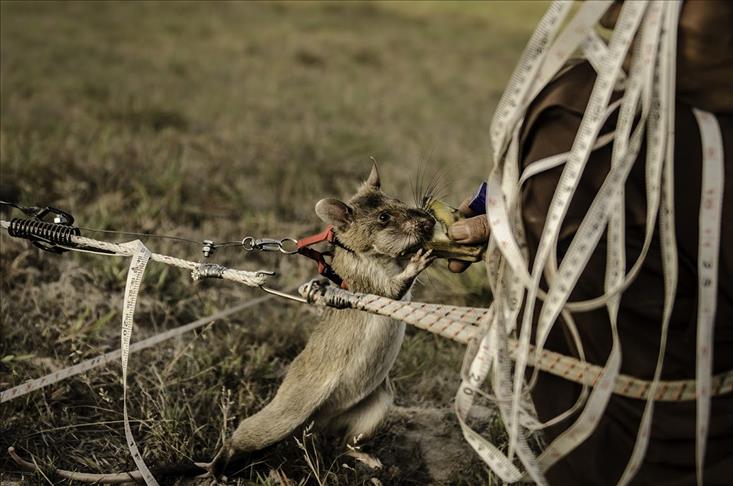
By Denise Hruby, (all photos © George Nickels)
PHNOM PENH, Cambodia
Smaller, faster, furrier.
In Cambodia, the first group of rats is training to help their human counterparts clear land still contaminated with mines and other unexploded ordnance (UXO) after decades of war.
It might seem odd to use rats as deminers, but Apopo, an organization that trains Giant African Pouched Rats to sniff out mines, says that they are in many ways better than other detectors.
“The rats, for example, are very good at finding mines over large areas where we believe the mines to be scattered,” James Pursey, communications manager for Apopo, told Anadolu Agency this week.
“This is because they ignore scrap metal like old coins, nuts and bolts and only sniff TNT” - mines' main ingredient.
The rats are trained with a simple click-and-reward system - “clicks" rewarded with usually bananas or peanuts, their favorite treats.
The click sound is quickly established as a conditioned reinforcer associated with a food reward. Once the rat learns that click means food it will now have to search for the target scent - in this case TNT - to earn its reward
Over time, the rats receive these treats for more specific tasks – the sniffing of a hole, telling explosives such as TNT or C4 apart from other smells, and finally the behavioral flagging of a mine by scratching the soil.
For their ability to save lives, the rodents are called HeroRats.
Apopo says its focus is not solely on finding a large number of mines; it lies on making agricultural land safe and releasing it to the local population.
“So for example in a village, one mine accident with, say, a cow, will keep everyone off that land forever, until we have arrived, found any remaining mines and declared it clear,” Pursey told Anadolu Agency.
Once trained, the rats can search 200 square meters (656 sq. feet) in 20 minutes - a task that would take a human deminer with a metal detector between one to four days.
The rats will come in handy in helping to demine the about 2,000 sq. km. of Cambodian soil still believed to be contaminated.
Since 1995, Apopo has worked to convince people of the rodents' impeccable noses.
A big success was celebrated in Mozambique, where more than 8,500 sq. km of land that could not be cultivated before are now safely being used by the local population—thanks to HeroRats.
Cambodia, one of the world's most heavily mined countries due to three decades of war, was always a planned destination for Apopo.
In the late 1960s and 1970s, when the country was caught up in the Vietnam war - followed by the genocidal Khmer Rouge regime - millions of mines were buried in the soil, adding to cluster bombs that were dropped by U.S. aircraft.
Since the Cambodian Mine Action and Victim Assistance Authority (CMAA) started tracking mine victims in 1979, about 20,000 Cambodians have been killed and 9,000 have had to have limbs amputated due to accidents with mines and UXO, CMAA told Anadolu Agency.
CMAA used to record more than 1,000 victims per year, but since demining efforts started the figures have dropped steadily.
In the first six months of this year, 11 people died, 43 were injured and 12 lost limbs in accidents with mines and UXO.
By the end of the year, Apopo hopes to deploy the rats in minefields.
Heng Ratana, general director of the Cambodian Mine Action Center (CMAC), told Anadolu Agency that for now, the rats are still undergoing tests, and need to build trust with the local population.
That, he said, could take some time, as Cambodians tend to picture rats skewered for barbecue rather than helping to save lives.
“Imagine they see a rat walking through the minefield, and then they are told that it's safe and they can use the land again," Heng says.
"If the rat makes a mistake, they will lose a leg [or their lives]," he adds, emphasizing the trust issues involved.
At the same time, the country needs cheaper options to continue demining.
Cambodia is increasingly struggling to allocate funds for the expensive and manually slow work. After 30 years of demining, donors are shifting funds to more recent areas of conflict, such as Iraq or Afghanistan.
With limited funding, CMAC estimates that 2040 could see the last victim of mines in Cambodia.
And any hope of getting the land cleaned earlier now rests with HeroRats.
- www.apopo.org #herorats
Anadolu Agency website contains only a portion of the news stories offered to subscribers in the AA News Broadcasting System (HAS), and in summarized form. Please contact us for subscription options.

